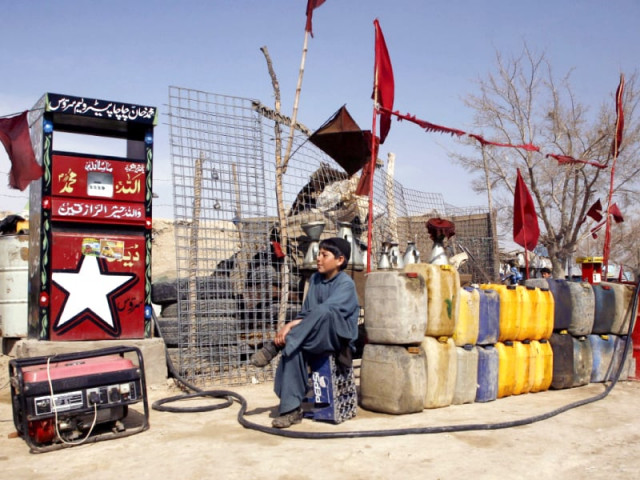‘Better than opium’: Iran sanctions spur boom for Pakistani diesel smugglers
Security forces in Balochistan may be complicit.

A boy sits next to plastic canisters filled with petrol that he says was brought from Iran. PHOTO: REUTERS
Some of the contraband is spirited across the mountains in Pepsi bottles carried by child smugglers. Yet more is loaded into pick-up trucks or siphoned into barrels and strapped onto mules.
So lucrative are the returns that even seasoned opium traffickers are abandoning their traditional cargo to grab a share of Pakistan’s closest thing to an oil boom: a roaring trade in illicit Iranian diesel.
As Western powers tighten sanctions on Iran, an unexpected set of beneficiaries has emerged in the hard-scrabble Pakistani province of Balochistan - smugglers lured by surging profits for black market fuel.
“Why smuggle opium when you can earn as much money by smuggling diesel? It’s much safer,” said a former opium trader from the Pakistani town of Mand, a smuggling hub near the Iranian border.
Diesel smuggling has long been a part of the illicit trade in Balochistan, where a thriving commerce in goods from guns and narcotics to duty free cigarettes and second-hand Toyotas constitutes one of the arteries of the globalised criminal economy.
But a Reuters inquiry into the fuel trade, based on interviews with participants across the province and a visit to remote parts of the frontier, has revealed that sanctions on Iran have made diesel smuggling extremely remunerative.
The findings also raise questions about the possible degree of complicity in fuel smuggling among Pakistani security forces stationed in Balochistan.
Twice as much
For years, diesel smuggled from Iran has supplemented the 2.7 million to 3 million tonnes of diesel that Pakistan’s state oil company buys from the Kuwait Petroleum Corp each year.
The illegal trade cooled in late 2010 when Iran cut fuel subsidies, narrowing profit margins for importers. But smugglers have gone into overdrive since late September.
Armed henchmen
The ease with which diesel smuggling has blossomed anew underscores the tenuous writ of the authorities in Balochistan.
So large are the sums involved that many suspect elements in the paramilitary Frontier Corps, which has primary security responsibility in Balochistan, and other agencies are involved.
“The Frontier Corps, coast guards and police provide the smugglers with protection in return for their share,” said a senior government official in Makran.
The Frontier Corps declined comment, but has in the past denied involvement in illegal trade.
Fuel importers and marketers said, however, that Pakistan’s over-stretched security forces turn a blind eye.
“Vehicles loaded with Iranian diesel and petrol provide us with fuel as a routine matter -- there are no hindrances to its transportation,” said Ghulam Ali, who sells the smuggled products openly in Quetta.
Published in The Express Tribune, April 2nd, 2013.



















COMMENTS
Comments are moderated and generally will be posted if they are on-topic and not abusive.
For more information, please see our Comments FAQ